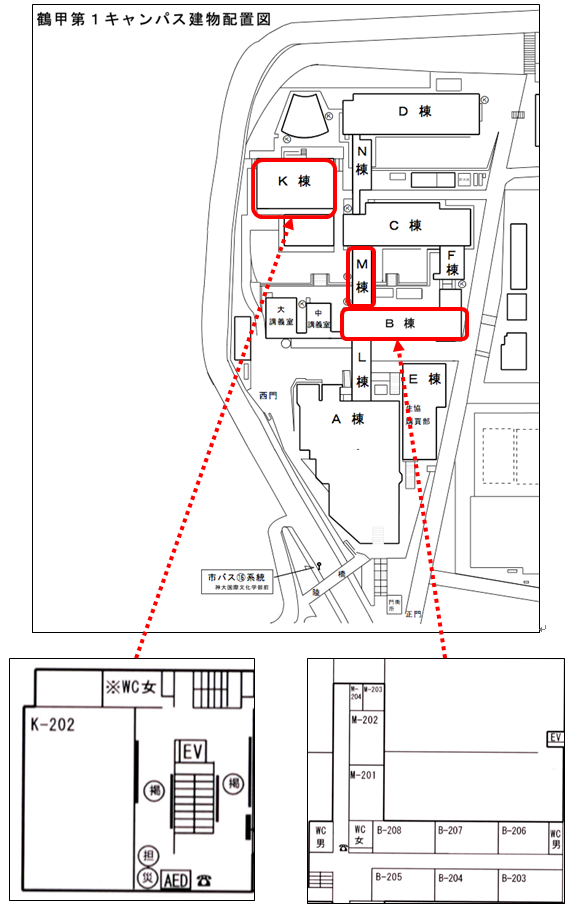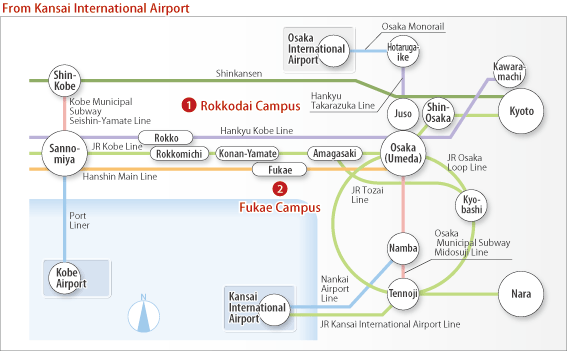The 29th General Meeting of the Phonetic Society of Japan
|
|
Host:
|
The Phonetic Society of Japan
|
|
Venue:
|
Kobe University, Rokkodai Daiichi Campus
1-2-1 Tsurukabuto, Nada-ku, Kobe-shi, Hyogo, 657-8501, Japan
(http://www.kobe-u.ac.jp/en/access/rokko/campus.html)
|
|
Organizer:
|
Ryoko Hayashi (Kobe University)
|
Day 1: Saturday, October 3rd
|
Venue:
|
Building B & M, Faculty of Intercultural Studies
|
|
12:00-
|
Registration
|
|
13:00-14:40
|
Oral presentations
|
|
14:40-14:50
|
Break
|
|
14:50-15:50
|
Poster presentations
|
|
15:50-16:00
|
Break
|
|
16:00-17:40
|
Oral presentations
|
|
18:00-20:00
|
Party (Japanese restaurant Sakura, 3rd floor, Academia Hall for Social Sciences, Rokkodai Daiichi Campus)
|
Day 2: Sunday, October 4th
|
Venue:
|
Buildings B & K, Faculty of Intercultural Studies
|
|
9:30-
|
Registration (for those who did not register on Day 1)
|
|
10:00-12:00
|
Workshop 1 (Room B207)
“Current issues in the study of 3-pattern accent systems”
Workshop 2 (Room B204)
“Residual voices: how to catch them”
|
|
12:00-13:00
|
Lunch break
|
|
13:00-13:45
|
Venue: Building K (Room K202), Faculty of Intercultural Studies
Opening speech
- Hirokazu Sato, President of PSJ
- Kazuhiro Ohtsuki, Dean, Graduate School of Intercultural Studies, Kobe University
- General Assembly
- Award Ceremony (Outstanding Article Award, Outstanding Presentation Award, Academic Research Incentive Award)
|
|
13:50-16:30
|
Public Symposium
“3-pattern accent system in Japanese: Principle and history”
- Chair: Tetsuo Nitta (Kanazawa University)
- Lecturer:
- Akiko Matsumori (Japan Women’s University)
“Past, present, and future of descriptive research of 3-pattern accent system: 3-pattern accent of Oki Islands”
- Yosuke Igarashi (Hitotsubashi University)
“3-pattern accent system of Miyako Ryukyuan: Ikema and Tarama dialects”
- Tetsuo Nitta (Kanazawa University) & Kohei Matsukura (The University of Tokyo)
“3-pattern accent system in Heiya region of Fukui”
- Commentator: Zendo Uwano (Professor Emeritus, The University of Tokyo)
|
|
16:30
|
Closing
|
Program (October 3rd)
Presenters with underline are eligible presenters for Outstanding Presentation Award. The awarding ceremony for this year will be on Day 2 (Sunday, October 4th) after the general assembly. Candidates are expected to participate in the ceremony.
Oral presentations 13:00 – 14:40, 16:00 – 17:40
Conference room A (Room M202, Building M, Faculty of Intercultural Studies)
|
|
Chair: Ayako Shirose & Toshio Matsuura
|
A1
13:00-13:30
|
“2 mora words pitch accent of Japanese learners in Taiwan: To aim at memory of accent, the listening comprehension and the accent pronunciation”
Kuanlin Chen (University of Osaka)
|
A2
13:35-14:05
|
“The accent pattern of Japanese compound noun produced by Chinese learners”
Ruilai Wang (Kobe University)
|
A3
14:10-14:40
|
“Sino-Japanese word accent production by native speakers of Chinese: Focusing on overgeneralization and L1 transfer”
Motong Li (Osaka University)
|
|
|
(Break & Poster Session)
|
|
Chair: Yasuyo Minagawa & Keiichi Tajima
|
A4
16:00-16:30
|
“Phonological interference of pronouncing Kanji words in Japanese learners in Taiwan- Analysis of vowel length”
Yu-wen Yang (Tokyo University of Foreign Studies, Ming Chuan University(Taiwan))
& Motoi Kawatsu (Nagasaki University)
|
A5
16:35-17:05
|
“Perception and production of special morae and yo-on (contracted sounds) by Japanese learners: A study of spelling performance as production data”
Miki Motohashi (Kansai Gaidai University) & Toru Ishizawa (Tokyo University of Foreign Studies)
|
A6
17:10-17:40
|
“Effects of VOT and f0 on stop voicing contrast in Japanese and Korean: a comparison between native speakers and Japanese learners of Korean”
Hi-Gyung Byun (Akita International University)
|
Oral presentations 13:00 – 14:40, 16:00 – 17:40
Conference room B (Room M201, Building M, Faculty of Intercultural Studies) |
|
Chair: Itsue Kawagoe & Donna Erickson
|
B1
13:00-13:30
| “Vowel Duration, Quality, and Pitch which Correlate with English Rhythm―Comparison between English Native Speakers and Japanese Learners of English”
Shigeo Nakano (Meiji Gakuin University)
|
B2
13:35-14:05
| “Effects of Vowel Quality in Stress Perception of English”
Sayoko Eguchi (Advanced Telecommunications Research Institute International)
|
B3
14:10-14:40
| “Perception of flap, stop, and liquid sounds in American English by Japanese speakers”
Mafuyu Kitahara (Waseda University), Keiichi Tajima (Hosei University)
& Kiyoko Yoneyama (Daito Bunka Univeristy)
|
|
|
(Break & Poster Session)
|
|
Chair: Yasunori Takahashi & Mafuyu Kitahara
|
B4
16:00-16:30
|
“Spanish Stress Perception: A Comparison between Native Speakers and Japanese Learners of Spanish”
Takuya Kimura (Seisen University/Sophia University) & Takayuki Arai (Sophia University)
|
B5
16:35-17:05
|
“Acoustic Analysis of Thai Tones in Three Word Sentences”
Yukie Masuko, Makoto Minegishi & Hirokazu Sato (Tokyo University of Foreign Studies)
|
B6
17:10-17:40
|
“The pitch patterns and word structure of Chinese disyllabic words: A case of “Tone4+Tone4” nouns”
Xi Chen (Osaka University)
|
Oral presentations 13:00 – 14:40, 16:00 – 17:40
Conference room C (Room M203, Building M, Faculty of Intercultural Studies)
|
|
Chair: Isao Ueda & Michinao Matsui
|
C1
13:00-13:30
|
“Young EFL Japanese learners’ perception and production capability of English sounds on non-words tests”
Hiromi Kawai (Kanda University of International Studies) |
C2
13:35-14:05
|
“Phrase-final lengthening and prosodic phrases in spontaneous Japanese”
Yoko Mori (Doshisha University) |
C3
14:10-14:40
|
“Pitch contours after the peak in Japanese accent systems”
Nozomi Kodama (Kumamoto University) |
|
|
(Break & Poster Session)
|
|
Chair: Tatsuya Hirako & Yosuke Igarashi
|
C4
16:00-16:30
|
“The accents in Ninomiya dialect”
Kaoru Sakamoto (Kokugakuin University)
|
C5
16:35-17:05
|
“A Comparison of the Effects of Different Accent Misuse Patterns on Perceptual Naturalness”
Chen Liang (Nagoya University)
|
C6
17:10-17:40
|
“A novel accentual variation of functional words observed in younger speakers’ pronunciation: Decline of the unaccented pattern of nagara-clauses”
Akio Nasu (Tsukuba University) & Fuka Kuriki (Minami-Rokugo elementary school)
|
Poster Presentations 14:50 – 15:50
Conference rooms D & E (Rooms B204 & B207, Building B, Faculty of Intercultural Studies)
|
|
Chair: Satoshi Ohta & Timothy Vance
|
|
P01
|
“Perception of Paralanguage Speech Acts Involved in the Emphasis of the Mental Attitude”
Masako Fukuoka (Mie University)
|
|
P02
|
“An audiovisual aid for instructing the timing of stress on learning English rhythm”
Tatsuya Kitamura (Konan University), Shogo Kagawa (Konan University), Ryo Nagata (Konan University)
& Koutaro Funakoshi (Honda Research Institute Japan)
|
|
P03
|
“The difference of prosodic features according to function”
Megumi Takamura (Kwansei Gakuin University) |
|
P04
|
“Basic Research in Japanese Moraic Nasal Production: Utterance Measurement Focusing on Phonetic Environments by Japanese Native Speakers”
Kenichi Ohyama (Tokyo Denki University), Masako Okubo (Aoyama Gakuin University)
& Keiko Hanzawa (Waseda University)
|
|
P05
|
“Production and Perception of Japanese /n/ and /r/ by Chongqing dialect speakers: Effects of phonetic environments”
Shuyi Yang (Kobe University)
|
|
P06
|
Lexicalized schwa in Armenian: the effects of lexical schwa
Astghik, Movsisyan (Nagoya University)
|
|
P07
|
“A study on the C/D model-based analysis of Japanese vowel devoicing”
Michinao Matsui (Osaka Health Science University)
|
|
P08
|
“The accent of declinable word in Suzuka Mie”
Haruka Takeuchi (Kokugakuin University)
|
|
P09
|
“Acoustic characteristic of “”the mood”” in the voice of the infant”
Yasuko Sakai (Konan Woman’s University), Narumi Amatsu (National Instruments Japan)
|
|
P10
|
“Falling tone, from historical accent materials standpoint”
Yuichiro Kasama (Tokyo University of Foreign Studies)
|
Workshop Program (October 4th)
|
Workshop 1: “Current issues in the study of 3-pattern accent systems” (Venue: B207)
|
- Organizer/Chair: Shinji Ogawa (Prefectural University of Kumamoto)
- Presenter:
- Kohei Matsukura (The University of Tokyo)
“3-pattern accent system of Kitagata and Hamasaka dialects in Awara-shi, Fukui prefecture”
- Hayato Aoi (JSPS/NINJAL)
“3-pattern accent system of Tarama dialect”
- Shinji Ogawa (Prefectural University of Kumamoto) & Reiko Aso (Tokyo University of Foreign Studies)
“3-pattern accent system of Hateruma dialect”
- Commentator: Nozomi Kodama (Kumamoto University)
|
|
Workshop 2: “Residual voices: how to catch them”(Venue: B204)
|
- Organizer/Chair: Toshiyuki Sadanobu (Kobe University)
- Presenter:
- Toshiyuki Sadanobu & Ryoko Hayashi (Kobe University)
“Residual voices and communication research”
- Chunyue Zhu & Toshiyuki Sadanobu (Kobe University)
“Residual voices and articulatory movement”
- Mihoko Teshigawara (Komazawa University)
“Residual voices and voice quality”
|
<Participation fee and proceedings>
Proceedings will be on sale at the registration booth (1000 yen for students, 2000 yen for members, and 3000 yen for non-members except students). Those presenting at the convention are asked to purchase the proceedings as participation fee. Students of undergraduate and graduate schools must show their student ID at registration. Proceedings will be on sale only at the convention venue. The public symposium is open to all.
<Proceedings back issues>
Back issues are on sale or distributed at registration. First come, first served. Pre-ordering and mailing will not be accepted.
The past two issues (27th and 28th conventions): 500 yen each
Issues before 26th convention: Free
<Membership registration>
If you wish to become a member, please register at the registration booth. Membership fee for this year is 7000 yen for members and 4000 yen for students. Admission fee is 1000 yen.
*Members cannot pay their membership fee at the convention registration.
<Party>
The convention party will be held on Day 1 (6pm, Saturday, October 3rd) at Japanese restaurant Sakura, 3rd floor, Academia Hall for Social Sciences, Rokkodai Daiichi Campus. Participation fee is 5000 yen for members, 3000 yen for students. Please make a reservation preferably by September 25th by sending your name and membership status (student member, non-student member, non-member) to
psj.party2015@gmail.com. Participation without reservation will only be accepted when there is vacancy. Pre-registration is recommended.
<Lunch>
The venue will not provide lunches. The university cafeteria will be closed on both days. There are no restaurants or stores near the campus, so please bring your lunch to the venue.
<Nursery room>
The nursery room is available during the convention with the cooperation of the venue. The fee is at a reasonable price (500 yen/hour for one child). Participants with small children are encouraged to use this system. Please make a reservation in advance if you wish to use this system. Further information will be announced on the website.
<Exhibition>
Books and acoustical instruments will be exhibited on both days in Room B208.
<Wireless LAN>
Participants will be able to use the wireless LAN. Please stop by at the registration booth if you wish to use it during the convention.
<Convention administration committee >
Ryoko Hayashi (Chair), Shunyaku Shu, Shin’ichi Tanaka, Gabor Pinter, Yasunori Takahashi (Kobe University)
<Planning Committee>
Haruo Kubozono (Head), Yosuke Igarashi, Donna Erickson, Mafuyu Kitahara, Hideki Zamma, Mariko Sugawara, Keiichi Tajima, Shin’ichi Tanaka, Michinao Matsui, Toshio Matsuura, Tim Vance
<Access to venue (Kobe University, Rokkodai Daiichi Campus)>
Please get off at JR “Rokkomichi” station, Hankyu “Rokko” station, or Hanshin “Mikage” station. Please take the Kobe city bus #16 bound for Rokko Cable, and get off at “Shindai Kokusai Bunka Gakubu mae” station. You can also walk from Hankyu “Rokko” station (15 minutes). The campus is 5 minutes from Hankyu “Rokko” station and 10 minutes from JR “Rokkomichi” station by car. There are several campuses around the area. Please do not get off at “Kobe Daigaku Seimon mae” and “Bunri Nougakubumae” stations.




